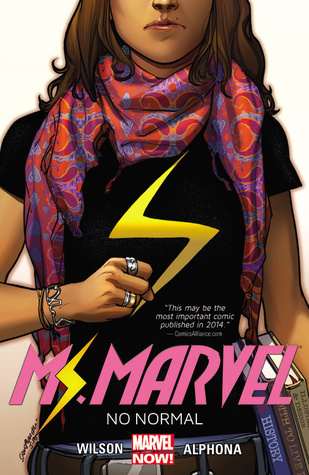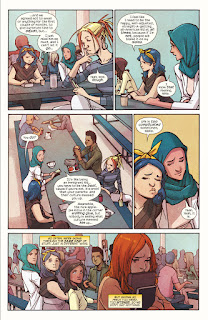The Marvelous Ms. Marvel
 Hey all! I'm a binge reader. So, when I'm in the mood, I can binge read multiple volumes of any given graphic novel title, and for the past month, I've been binge-reading Ms. Marvel. And, since we're all here to share takeaways, this is mine: Kamala Khan as Ms. Marvel is an utter delight! I think the title hits all the right notes with this Muslim teen hero. Kamala reads age and culturally appropriate in a way that Gaby Rivera's pan-Latin American hero America Chavez just doesn't.
Hey all! I'm a binge reader. So, when I'm in the mood, I can binge read multiple volumes of any given graphic novel title, and for the past month, I've been binge-reading Ms. Marvel. And, since we're all here to share takeaways, this is mine: Kamala Khan as Ms. Marvel is an utter delight! I think the title hits all the right notes with this Muslim teen hero. Kamala reads age and culturally appropriate in a way that Gaby Rivera's pan-Latin American hero America Chavez just doesn't.Throughout G. Willow Wilson's run, Kamala struggles with how to balance her school, familial, and heroic obligations. Just your typical teenage stuff right? Well, actually yes. In the sense that as teens we all dealt with a wealth of internal and external pressures magnified because of our raging hormones. We might not have superpowers, but isn't Kamala's superhero-ness and its accompanying responsibilities merely a metaphor for adulthood?
What makes Ms. Marvel such an entertaining and poignant read is that she is grounded. She's grounded in family values and cultural traditions. Kamala might be able to change shape and size, but her powers do not define her. Kamala can quip nerdisms, eat gyros, and refer to Islamic traditions all within the span of a couple of panels. But, Ms. Marvel isn't a graphic novel of one. The supporting cast of characters: her family, friends, and mentors all add to this series' brilliance.
I think I've said a lot of vague but enthusiastic remarks about what makes Kamala great. So here's a page:
Mike and Nakia's dialogue about the hardships kids from non-heronormative or non-dominant culture families face when it comes to education and subsequently, access rings painfully true. When Nakia says, "...You have to be the best, 'cause if you're not, it's proof that your parents and their culture messed you up" (56). When I read this, I couldn't help but to think: "Oh my god, yes!!!" This is exactly how I felt as a first-gen kid. And, I am sure that this is exactly how others in similar circumstances feel. Why? Because like Mike and Nakia intimate, we (I'm including myself in here) carry the burden of our families' hopes and fears. The hope that if we are the best we will become successful and therefore, validate the sacrifices our families have made. The fear that we will undergo the same economic and political inequities if we are not the best. We are not afforded the same privilege children from heteronormative or dominant-culture families have in spades. Instead, we must be the best because society at large, the dominant-culture at large, has said we don't matter unless we are the best. And even then, even when we are the best, it's never quite enough.
This is what Ms. Marvel does so well--embed poignant and important conversation pieces into seemingly innocuous scenes. This is an important conversation, but Wilson doesn't awkwardly shoehorn or stage it into Kamala's narrative. Instead, this is Mike's (a supporting character) moment. She misses Bruno, her boyfriend, and through this moment, Wilson is able to express the burdens children of non-heteronormative or non-domininant culture families contend with on a daily basis. I love Ms. Marvel because it addresses first-gen teen issues without ever becoming heavy-handed about the immigrant/marginalized experience.
TORY OTP NINJA BLOG BOMB: KAMALA x BRUNO FIGHT ME!
(Ms. Marvel vol 7: Damage Per Second 56)
This is what Ms. Marvel does so well--embed poignant and important conversation pieces into seemingly innocuous scenes. This is an important conversation, but Wilson doesn't awkwardly shoehorn or stage it into Kamala's narrative. Instead, this is Mike's (a supporting character) moment. She misses Bruno, her boyfriend, and through this moment, Wilson is able to express the burdens children of non-heteronormative or non-domininant culture families contend with on a daily basis. I love Ms. Marvel because it addresses first-gen teen issues without ever becoming heavy-handed about the immigrant/marginalized experience.
TORY OTP NINJA BLOG BOMB: KAMALA x BRUNO FIGHT ME!



Comments
Post a Comment